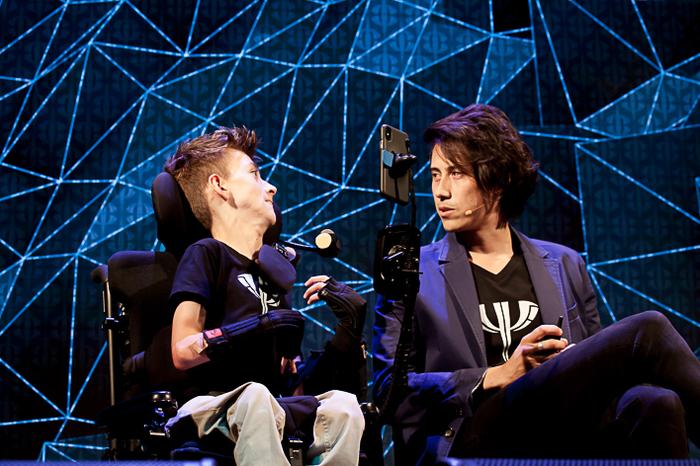Over the past few months, two colleagues at Sydney start-up Psykinetic have been engaged in battle.
Nick Temple, chief technology officer, and Riley Saban, researcher and tester, have each been pushing their powers of concentration to top a scoreboard for the company’s soon-to-be-released flagship product, Frontier.
Frontier is touted as the ‘world’s fastest eye-controlled communication keyboard’. Users utilise off the shelf eye-tracking devices to select letters on a qwerty keyboard. Algorithms in the backend learn and adapt to an individual’s eye movements allowing them to clock significant speeds. The text can then be converted to speech.
Temple is currently hitting 44 words per minute (wpm). Saban, a Year 9 student born with cerebral palsy, is trailing him by a word or two. And he’s not too happy about it.
“I like challenging my personal best…Those close to me understand how competitive I can be,” Saban told the audience at a Psykinetic launch event in Sydney last week.
“My personal goal is to beat our software’s developer Nick Temple. He has the highest score to date. But not for long. Nick, look at me, I’m coming for you,” Saban joked.
When Frontier is launched next month they’ll be many more trying to trump Temple’s score. In trials, the company says, it saw people without any practice hitting scores in the high 20s.
To put that in context, rival eye-gaze typing tools have achieved around 24 wpm, with testers reaching up to 30wpm. Most people, when using their hands to type, have a speed of 40 wpm.

“I love that inclusive tech has come so far in such a short amount of time,” Saban said. “It blows my mind to try and comprehend what will be achieved in my lifetime.”
Wild frontier
Frontier has three settings: beginner, turbo and superhuman. In the first, the user fixes their gaze on a letter for about a second to select it, then moves to the next letter and dwells on it for a second and so on.
The software works with standard, off-the-shelf eye-tracking hardware, which usually takes the form of a small, slim bar that sits on top of a user's computer screen.
Initially the Frontier keyboard – which has hexagonal keys – had a space bar, but it was found users usually look ‘up’ towards the text box after spelling out a letter. The software was soon updated so that looking ‘up’ entered a space.
In the turbo setting users only need dwell on the first letter of a word and swipe through the rest of the letters. With the superhuman setting – “this is the fastest keyboard, which takes the most practice” Saban says – users only dwell on the first letter of the entire piece being written.
After that they move their gaze through the rest of the letters in the words, looking up to enter a space, until sentences and paragraphs are typed out.
The speed and relative ease of typing with the tool is a “game changer” for users, Saban says.
“[The Psykinetic team] has developed software which will improve the quality and speed of conversations around the world. I know first-hand the importance of keeping up with general conversation and using a communication device. Frontier ticks all the boxes,” he said.
Life changing
Psykinetic – which is registered as a National Disability Insurance Scheme (NDIS) service provider – is the brainchild of Dr Jordan Ngunyen. The son of an artist and a professor, Nguyen says he had a "bit of a different upbringing to a lot of kids in the '80s, getting to share my toys with robots".
He followed his father into electrical engineering, but felt lacking in purpose, he says. Then in his third year at university came a diving accident which "changed everything for me".
"I started to wake up to my own reality, and started to imagine what life would be like if I had of broken my neck diving into this pool," he recalls.
For his Phd at UTS Nguyen developed a mind controlled wheelchair. The wheelchair uses cameras to see its environment and navigate move through it, but is directed by electrical signals in the riders brain, picked up by a headband fitted with electrodes.
The project led him to meet Saban, with whom he made the ABC documentary Becoming Superhuman, and Jessica Irwin, now the company's web developer, who featured in SBS documentary Game Changers.
Two years ago, Nguyen turned the company's focus to developing software optimised to use readily available inputs like eye-trackers, switches and brain activity monitors.
"We already have equipment around the world that can help out, why don’t we just harness that? The things that are off-the-shelf, the technologies people can already access, why don’t we design something that can get out there very quickly?" Nguyen said.
After developing Frontier, the Psykinetic team was building a launcher so users could easily bring up the keyboard and move between apps.
"We wanted a launcher. Then we realised it could be bigger than that. It could be somewhere where we pushed different ideas, and new concepts, new programmes and apps. Then we went, actually, why don’t we make this an entire store?" Nguyen said.
The result is Stargaze, which the company says is the world’s first app store for eye-controlled, switch-operated, and alternative interface systems.
It will eventually feature all kinds of tools and games, and it is hoped companies will develop and load accessible versions of their apps there.
One of the first of these apps is Atmosphere, an eye-controlled music making app which allows users to trigger sounds and instruments and layer tracks with their eye movements.

In a demonstration last week, Irwin, who was born with a high level of cerebral palsy was joined on stage by musician Steve Bilbi to perform a remix of one of his songs. Winners was released as a single this week.
"I've always believed that if you can imagine it, you can achieve it," Irwin said. "And I've always dreamed of making music. Today, through the magic of eye-controlled technology, my dreams comes true."
An earlier version of the technology was used by Irwin in her performance with the Australian Piano Quartet at the Sydney Opera House in 2016.
“Through the magic of technology and creativity, anything is possible. Everyone has the capacity to contribute to society, improve the lives of others, and ultimately work towards a better world for future generations," Nguyen said.
"We are launching the starting points of a powerful movement that will open up a world of possibilities and empower individuals with more technological tools to help create that change.”

